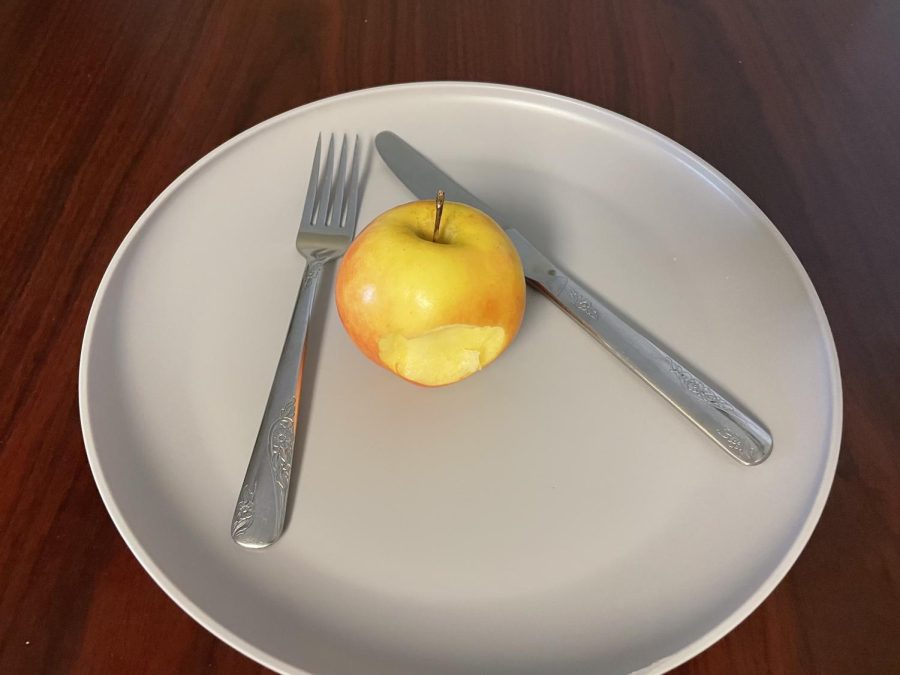OPINION: ‘You look so pretty with your eating disorder’: The glamorization of starvation
April 7, 2023
Picture this, it’s summer, I just got back from the pool and for some reason my mom asks me how much I had eaten that day. Little did she know I was counting down the minutes until I could have my handful of mixed nuts. It was 3 p.m., and she made it clear that I was to never intentionally starve myself again.
My fatphobic tendencies started around the age of 10. I was grouped in with the 81% of 10-year-olds who fear being fat. I also fit into the 42% of first through third graders who long to be thinner.
Most Americans struggle with fatphobia because of the changing and unrealistic beauty standards placed on women. People who live in larger bodies are constantly criticized for being “lazy” or “unhealthy,” forcing people to control their eating habits and overexercise. Obesity is unhealthy and undesirable but being emaciated is unhealthy yet desired.
The fear of being fat starts at a young age and perpetuates as people get older. So, skipping breakfast and only having toast for dinner quickly becomes a downward spiral towards the restrict, binge and purge cycle.
Social media, supposedly a fun way to connect with people, continuously connects people to unhealthy eating habits. In all actuality, the rise of social media actively romanticizes eating disorders.
“It’s so easy for young girls to fall victim to the ‘nothing tastes better than skinny feels’ complex,” my best friend Kristiana Corona said. “Putting this kind of greater emphasis on physical image rather than my health is what made me develop an eating disorder. I never understood how it can truly destroy my body until it was too late.”
Over 28.8 million Americans will have an eating disorder in their lifetime. However, only 6% of people with eating disorders will be medically diagnosed as “underweight.”
Social media platforms like TikTok and Instagram have launched a trend titled “What I Eat in a Day.” These short videos depict thin influencers showing their small meals and snacks throughout the day. These videos automatically offer aspirational images of white, slender bodies while also glorifying disciplined diets.
According to the National Eating Disorder Association, 35-57% of adolescent girls engage in crash dieting, fasting, self-induced vomiting, diet pills or laxatives. The social media algorithm normalizes eating disorders causing young children to control their caloric intake, overexercise, and hyper fixate on their weight.
Social media over-exposes people to “idealized” bodies causing them to strive for unobtainable goals that cannot be healthily sustained. Scrolling through appearance related content leads to constant comparison and unrealistic standards.
“Looking at any type of fashion or beauty content showcasing models and various influences who are naturally very thin which is unobtainable for so many people.” Corona said. “Why is it that this one body type (skinny) gets glorified when in reality, barely any women look like that?”
The 2017 Netflix movie “To the Bone,” starring Lily Collins, illustrates a young girl who struggles with anorexia and is constantly in and out of treatment. There is an abundance of movies in the media about anorexia however, only a few about bulimia and binge-eating disorders which affect the population majority. Throughout society eating very little, or not eating at all is seen as a fabulous goal that needs to be obtained. Movies that showcase emaciated bodies and starvation unintentionally glamorize anorexia while shaming other, more common eating disorders, like bulimia and binge-eating.
The cultural portrayals of anorexia have become indivisible from the actual disease. Any truthful depiction of anorexia can trigger those who struggle with it because the disease is competitive in nature. Illustrating the particularities of eating disorders automatically normalizes and romanticizes them.
Eating disorders are glorified in films, books, and social media, creating the idea that people should strive towards the illness. Society is so invested and fascinated with the malnourished female body. Small female bodies are praised, making eating disorders seem like a practical and romantic way to fit into society’s idea of perfection.
“Honestly, I think social media and eating disorders will always go hand-in-hand,” Corona said.
Chloe Robertson is a guest columnist. Contact her at [email protected].












